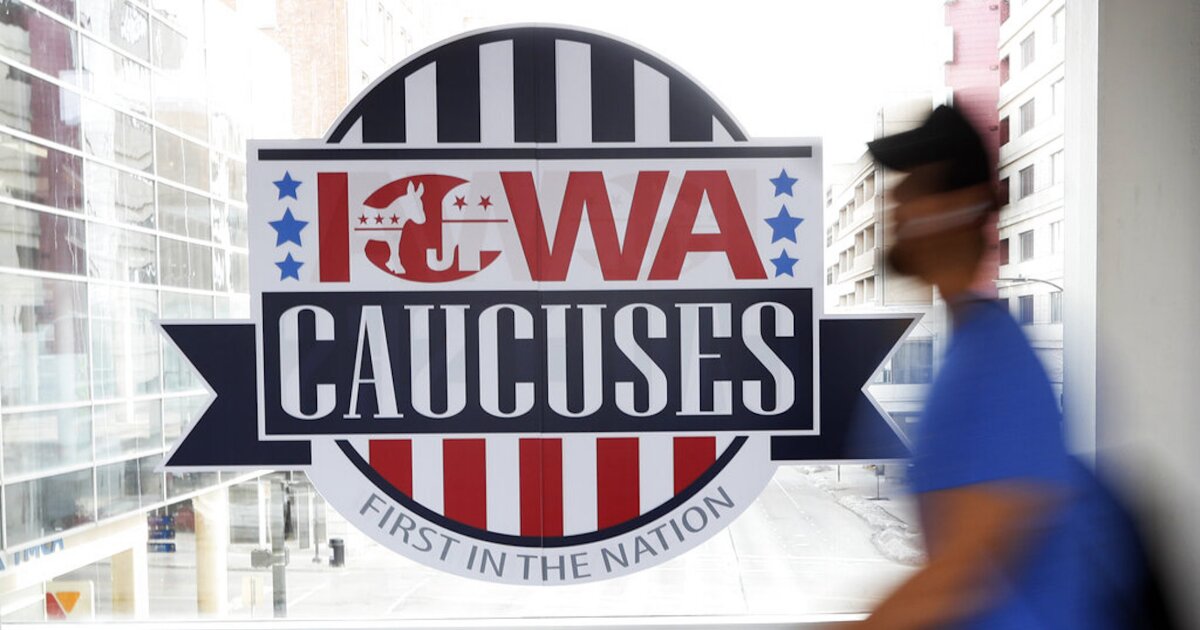

DES MOINES, Iowa — New Hampshire has attracted national headlines in recent weeks after state lawmakers vowed to reject President Joe Biden’s new Democratic primary calendar for 2024 — yet the Granite State may find it has allies readying to fight a battle of their own in Iowa.
Iowa Democrats are quietly considering a rebellion against the Democratic National Committee’s revised calendar for presidential primaries, which strips the Hawkeye State of its coveted first-in-the-nation caucuses. Although no plans have been set in motion to defy the DNC, state officials say there is “a lot of chatter” about the issue.
WHY DEMOCRATS CHOSE THESE FIVE STATES TO KICK OFF THEIR 2024 NOMINATING CALENDAR
“Everything is on the table,” a veteran Iowa Democratic State Central Committee member told the Washington Examiner.
Over the last half-century, Iowa has led the country’s primary season with its caucuses, which took on outsize influence after Jimmy Carter, a peanut farmer and former governor of Georgia, used his Iowa caucus win as a launchpad to the White House.
The DNC voted earlier this month to reconfigure the primary nominating calendar for the 2024 elections, placing South Carolina in the No. 1 slot, followed by Nevada and New Hampshire on the same day one week later, then Georgia, and finally Michigan. The updated schedule omits Iowa from the early state lineup altogether.
The decision to update the lineup had been on Democrats’ minds for years, but the conversation received renewed attention after the 2020 caucuses in Iowa were crippled by technological difficulties that delayed the vote count for several days. Democrats have also griped that since Iowa lacks diversity, it’s no longer representative of the U.S. population.
As a result, Biden in December submitted a proposal that would place South Carolina at the front of the pack, pointing to the Southern state’s large black population. South Carolina breathed new life into Biden’s candidacy in the 2020 election, and the move has been described as a reward for the role the state played in sending the president to the White House.
Although his proposal was approved by the full DNC, Democrats in New Hampshire and Iowa, both displaced by the new lineup, have vocally objected.
“There’s been bad arguments about diversity … but it is disappointing that the national Democrats have come up with a calendar that ignores the states in the Midwest,” Rita Hart, chairwoman of the Iowa Democratic Party, told the Washington Examiner. “There’s no representation of states from the Central or the Mountain Time [zones]. That’s a lot of people that I don’t think the Democratic Party intends or should intend to ignore.”
Iowa Democrats, who hope to stay in at least the “top tier” of five early primary states, believe legal hurdles in New Hampshire and Georgia could make national Democrats’ new calendar unworkable. The two states missed a Jan. 5 deadline to update their primary dates, with party officials lamenting that they are powerless to do so.
New Hampshire law requires that the state hold the first-in-the-nation primaries; Iowa has a similar law mandating that its caucuses be held “at least eight days earlier than the scheduled date” of any other state primary.
In New Hampshire, the authority to change primary dates rests with a GOP governor and state legislative leaders, while in Georgia, the date is set by Republican Secretary of State Brad Raffensperger.
New Hampshire Gov. Chris Sununu (R) is adamant his state will continue to hold the nation’s first primary, and Raffensperger has vowed not to change Georgia’s primary date unless the Republican National Committee also gets on board. The GOP plans to maintain its current primary calendar.
Although state officials describe the calendar as “unrealistic and unattainable,” the DNC has voted to extend its deadline for Georgia and New Hampshire until June 3.
“This is not a done deal. There’s so many factors here where states are going to have to follow their state law,” Hart said. “It’s kind of interesting how there’s so much discussion around the fact that we’re creating a system where people are trying to control other states or control state laws.”
Hart believes the DNC plan may be unworkable due to state opposition and has suggested Iowa may be among the early states this cycle simply due to the logistical hiccups standing in the way.
“While this has been voted on, it certainly is not clear exactly how this will end up being reality,” Hart said. “So, we’re going to continue to have these conversations, and I think it’s very important that Iowa remains in that top tier.”
Under DNC rules, each state is required to submit a delegation selection plan that includes a proposal for when the state will hold its primary elections. If a state such as Iowa or New Hampshire does not comply with the DNC’s newly approved calendar, it could prompt national Democrats to impose sanctions on the individual states.
It’s not entirely clear what these sanctions would look like, but they could include measures such as blocking certain candidates from campaigning in those states or having delegates stripped during the national convention.
CLICK HERE TO READ MORE FROM THE WASHINGTON EXAMINER
“Nobody’s happy with the fact that we’re fighting to stay in this top tier,” Hart said. “I think people recognize that this is something that Democrats and Republicans should do together and all at the same time.”
The Republican National Committee voted last year to reaffirm its presidential primary calendar, keeping its lineup of Iowa, New Hampshire, South Carolina, and Nevada.







